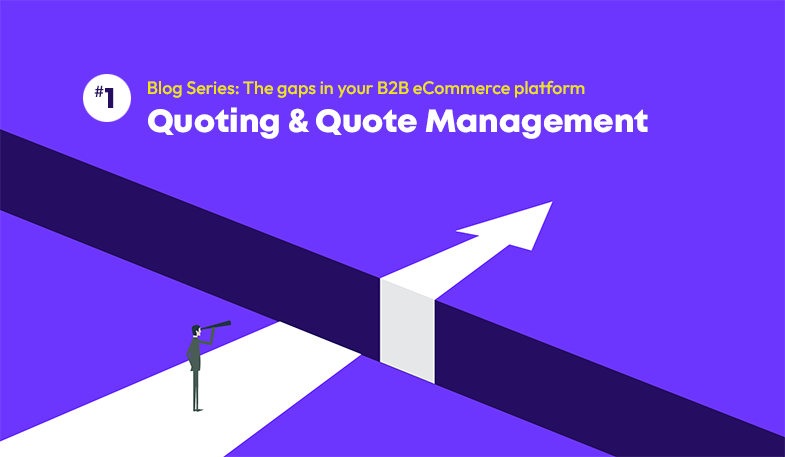B2B vs B2C eCommerce: Key Differences

We all know the superficial differences between B2B and B2C eCommerce. One targets individual consumers, the other targets business users acting on behalf of their enterprises. While an eCommerce platform may work for either market type, there are a number of considerations to review during the eCommerce engineering process that will ensure you launch successfully.
Let’s review the differences between the two and discuss some strategies for improving eCommerce engagement.
B2B eCommerce: Logic and Structure
Business users live in a world of value exchange. How will your product help them better serve their customers? If B2B buyers can’t see a potential benefit in a partnership with your company, you’ll have no chance of winning their business. It’s up to you to make these value propositions clear by speaking to them on their terms.
The typical B2B buying process has several defining characteristics:
Collaborative Decision-Making
Every business decision needs the input of multiple stakeholders across sales, marketing, finance, and more. You’re not speaking to a single buyer—you’re speaking to a team of buyers, each of whom will have his/her own pain points that you’ll need to address in your messaging.
Considerations for your eCommerce Platform:
- Are users able to start, edit, and share an order?
- Is the system able to generate quotes and save those to an order?
- Is there a built-in system to manage the reordering process?
- Are integrations possible for managing large or bulk orders?
- Is the checkout and ordering process capable of having B2B-specific options, such as purchasing with POs, multiple address delivery, or freight shipping?
Information-Driven Process
B2B buyers are logical and information-driven. They perform extensive research on their options before committing and prefer content with concrete statistics they can use to justify their decisions to their stakeholders. This is a defining feature of B2B eCommerce: As many as 98 percent of B2B buyers do research before signing.
Considerations for your eCommerce Platform:
- Will layout and design restrictions within the platform prevent you from selling as you need?
- How extensible are the product, accounts, and orders? Are you able to add a variety of data points and marketing fields to each?
- Will you be able to seamlessly connect customizations or integrations with backend systems for product, account, or order information?
- For example, search is always such a challenge, and it almost always needs to be customized to the unique product set. Can you layer your requirements into the built-in search and filtering system?
Long-Term Relationships
Business buyers don’t just purchase from the first company that catches their interest. They tend to form long-term relationships with their vendors, speaking with specific reps, asking questions, and establishing trust before committing their resources.
Considerations for your eCommerce Platform:
- Which connections, from your eCommerce platform to external marketing systems, will be required? Email? CRM? Analytics?
- Are you able to build out robust post-order marketing messaging and follow-ups?
- Building a relationship relies on managing and maintaining solid customer support – is the order process manageable through the platform by a sales rep?
- Are sales reps able to review, update, and monitor their clients’ orders?
Of course, other issues—such as price—certainly matter too, but price actually matters less to B2B buyers than you’d think. There’s this idea out there that every business is budget conscious and penny-pinching, but often, the opposite is true. Budgets can be flexible, and many companies are more than willing to invest a little extra for companies that can earn their trust, reduce risk, and eliminate uncertainty.
B2C eCommerce: Speed, Style, and Status
eCommerce vendors selling directly to consumers have a different set of goals.
Immediacy
B2B buyers might be willing to do weeks of research before buying, but consumers aren’t. B2C purchases tend to be smaller in scale and finished quickly. Shoppers want fast overviews and easy-to-understand value propositions to help them make decisions on the spot.
Considerations for your eCommerce Platform:
- Are you able to be everywhere the customer expects you to be? Are you shoppable on mobile, desktop, and online marketplaces?
- Is all the information, regardless of location, shared between storefronts? Does your mobile store have access to your customers’ previous order history?
- Does your platform allow a headless commerce implementation to serve multiple types of end users with separate sites?
Emotion-Driven Processes
B2C shoppers tend to make purchases based on perceived emotional benefits—in other words, desire and motivation. They don’t care about generating profit; they care about products that make them happy and improve their lives. This plays into the immediacy of their shopping process, as they often don’t research products until the moment they need them.
- Status: Entirely unique to B2C commerce is the concept of status. Consumers place tremendous value on social proof when purchasing and often prefer stylish products that earn them this validation.
- Cost: Pricing is a key factor for B2C buyers, particularly in an eCommerce landscape where shoppers have unlimited options. It’s the reason big-box eCommerce vendors like Amazon have captured so much market share. All other things equal, why not go with the lowest price?
Conclusion
Overall, there are many areas where B2B and B2C converge, and every eCommerce store owner must provide an intuitive and easy to navigate website and storefront or risk losing customers. However, it’s also crucial to be aware that there are significant differences between the two and use the considerations we discussed above to create the most relevant buying experience for your target audience.
Resource Center

A new blog series about the critical eCommerce capabilities missing in most eCommerce platforms for B2B companies. #1: Quoting & Sales Support

A closer look from the Ultra perspective on what we really mean when we talk about headless commerce and why it may not be right for every company.

Davis Art is now the only online K-12 publisher dedicated to the arts, creating top-notch curriculum and resources for art educators nationwide, all from the Ultra Commerce platform.
